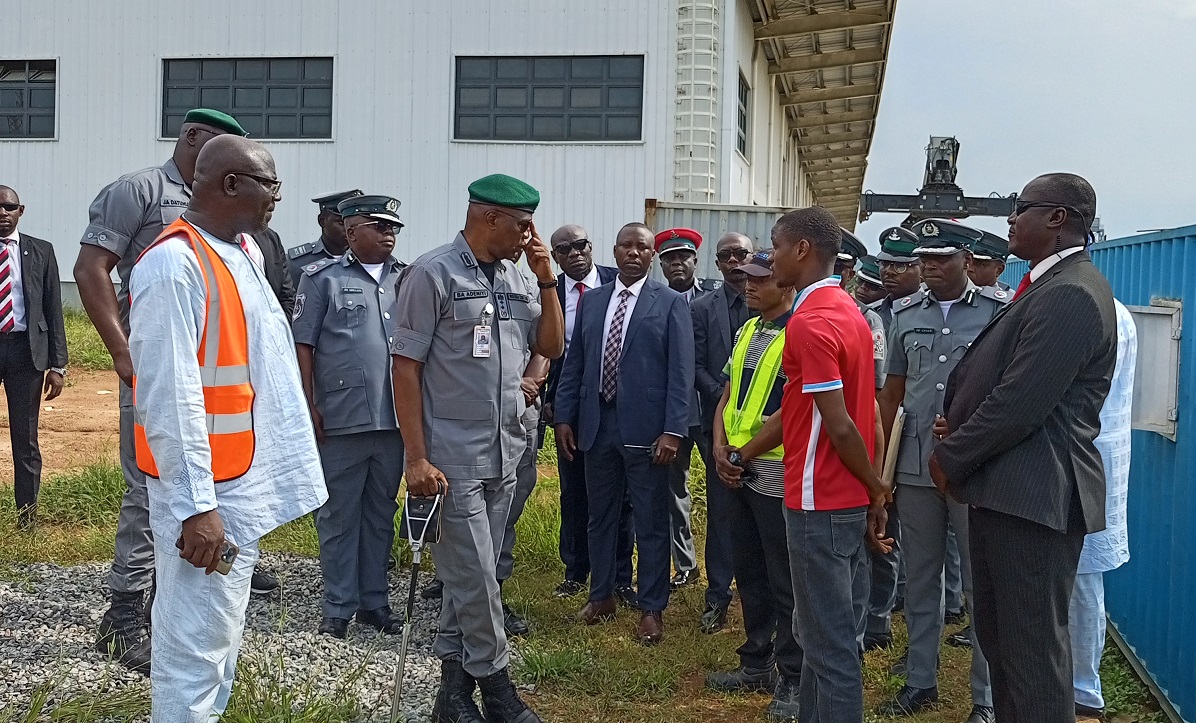
The Comptroller General of the Nigeria Customs Service (NCS), Bashir Adewale Adeniyi, has urged officers to equip themselves by learning, unlearning, and relearning in order to brace for the challenges ahead as they progress in their careers.
The Comptroller General gave this admonition during a working visit to the Oyo/Osun Area Command headquarters in Ibadan, Oyo State, on Tuesday.
He was received by the Customs Area Controller, Comptroller Joseph Olugbuyi Adelaja, and other senior officers of the command.
During an interactive session with the officers, CG Adeniyi described the Oyo/Osun Command as unique, strategic, and important to the operations of the Nigeria Customs Service, noting that all forms of Customs procedures—such as revenue generation, enforcement, excise, trans-shipment, and various modes of transportation—are carried out there.
He stated that the future of the Nigeria Customs Service lies with the younger generation of officers who are currently at the mid-level of their careers, including Superintendents, Chief Superintendents, and Assistant Controllers.
He emphasised that career advancement would favour those who demonstrate capacity based on what they know, not who they know, stressing that promotions under his leadership have been strictly merit-based.
ALSO READ: Fund mismanagement: Cross River Assembly suspends LG chair for three months
“Promotions, whether through regular exercises or special merit-based initiatives, will depend on your knowledge and contribution to the overall management of the Service,” the Comptroller General stated.
He encouraged the officers to adopt best practices, discard outdated methods, and ensure their presence in the command is impactful.
He assured them that their welfare remains a priority and that the issue of insufficient junior officers would be addressed.
He also announced that between six and eight vehicles would be allocated to the Oyo/Osun Area Command to enhance operations.
The CG disclosed that an automated vehicle verification system is being tested and would soon be deployed. This system will enable enforcement officers to verify any vehicle using a smart device to determine whether it has been cleared through the customs system.
He further revealed plans to launch an ICT-driven Geo-Spatial Intelligence System to guide Customs patrols more efficiently, replacing random roving with targeted surveillance.
He explained, “If we connect to geo-spatial intelligence, we will be able to acquire satellite images that show us what is happening in specific areas.
“The use of such technology will help us optimise the manpower we have.”
With these innovations, CG Adeniyi urged officers to reposition themselves, particularly their mindset, saying, “The tone of the music will change in Customs administration, and when that happens, your dance steps must change to keep in step.”
He reminded them to remain vigilant, noting that their actions or inactions could impact national security and economic development.

Earlier, in his welcome address, Comptroller Joseph Adelaja expressed gratitude for the CG’s visit, describing it as a morale booster.
He outlined the Command’s achievements since assuming office on February 6, 2025, including revenue generation of over ₦28 billion, compared to ₦23.8 billion during the same period the previous year.
He also reported seizures of prohibited items worth nearly ₦918 million between February and May 2025.
However, he highlighted key challenges facing the Command, including manpower shortages, unreliable electricity at the Customs barracks, and insufficient operational vehicles for fieldwork.
As part of the visit, CG Adeniyi inspected the Ibadan Train Station Terminal in the Moniya area of Ibadan and a prospective private bonded warehouse.
He noted that, once operational, the warehouse would enhance trade facilitation and expedite the clearance of goods to their final destinations.
He emphasized the importance of ensuring the integrity of cargo transported by train, with containers properly accounted for in terms of revenue and inspection, so they do not pose a security risk.
“If we are going to have an Inland Container Terminal here, the containers must be subjected to Customs procedures, rules, and regulations to ensure that appropriate measures have been taken for any containers handled by that company,” the Comptroller General said.
WATCH TOP VIDEOS FROM NIGERIAN TRIBUNE TV
- Let’s Talk About SELF-AWARENESS
- Is Your Confidence Mistaken for Pride? Let’s talk about it
- Is Etiquette About Perfection…Or Just Not Being Rude?
- Top Psychologist Reveal 3 Signs You’re Struggling With Imposter Syndrome
- Do You Pick Up Work-Related Calls at Midnight or Never? Let’s Talk About Boundaries






